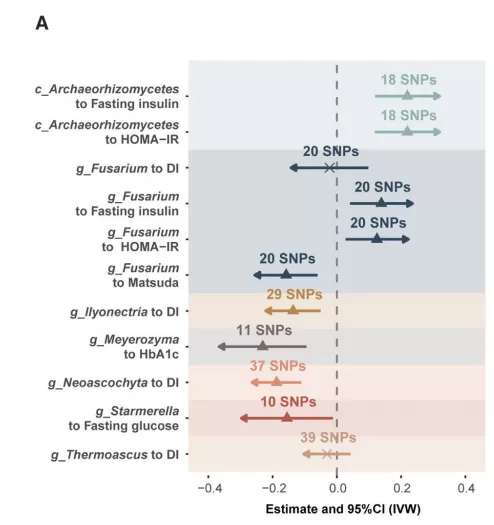Gut Fungal Metabolism in Blood Glucose Regulation
We are very pleased to share the type 2 diabetes mellitus (T2DM) study published in Med Journal. The authors of "Enhanced interactions among gut mycobiome with the deterioration of glycemic control" found that the more complex the gut fungal interaction network, the more severe the deterioration of glucose metabolism (detected by TM widely-targeted metabolomics). Fungi of the genus Fusarium may be the key culprit leading to changes in the gut fungal network. They interfere with insulin signaling pathways by affecting the levels of various metabolites, exacerbating insulin resistance. This research reveals a new mechanism by which gut fungal metabolism regulates blood glucose balance, providing new insights and targets for the early prevention and treatment of type 2 diabetes.
Association between Gut Fungal Composition and Type 2 Diabetes Progression
Researchers conducted a comprehensive and systematic analysis of the gut fungal composition of newly diagnosed type 2 diabetes patients, pre-diabetic individuals, and healthy controls using internal transcribed spacer (ITS) sequencing. The results showed that the gut fungal composition was closely related to indicators of diabetes progression, such as insulin sensitivity. Compared to pre-diabetic individuals and healthy controls, newly diagnosed type 2 diabetes patients had a significantly increased gut fungal richness, while the variation in fungal composition between individuals was significantly reduced. This suggests that the gut fungal composition of diabetic patients is more similar and stable.
 Correlations between intestinal fungi and clinical phenotypes (H) The effect size of gut fungi on clinical indices related to glycemic control_1717690035_WNo_786d327.webp)
(G) Correlations between intestinal fungi and clinical phenotypes.
(H) The effect size of gut fungi on clinical indices related to glycemic control.
Gut Fungal Co-occurrence Networks and Their Role in Metabolic Deterioration
Next, the researchers constructed gut fungal co-occurrence networks based on different glucose metabolism states and found that the interaction between gut fungi increased with the deterioration of glucose metabolism. Interestingly, key fungi, such as Fusarium, Archaeorhizomycetes, Neoascochyta, Ilyonectria, Thermoascus, etc., were closely related to changes in insulin sensitivity-related indicators (such as Matsuda index) and pancreatic function indicators (such as disposition index). These fungi drove the changes in the fungal interaction network.
 Overlap of the driver fungal taxa identified in the whole cohort and two propensity-matched sub-cohorts (E)Associations of overlapping driver fungus_1717689973_WNo_770d305.webp)
(D) Overlap of the driver fungal taxa identified in the whole cohort and two propensity-matched sub-cohorts.
(E)Associations of overlapping driver fungus taxa in (D) and clinical indices.
Functional Role of Key Fungi in Metabolic Deterioration
Further bidirectional Mendelian randomization analysis revealed that Archaeorhizomycetes, Fusarium, and Neoascochyta fungi are important functional fungi that contribute to metabolic deterioration.

(A) The forest plot showing the potential causal associations observed between driver fungus taxa and clinical indexes related to insulin sensitivity or insulin resistance.
Role of Circulating Metabolites in Fungus-Mediated Metabolic Regulation
In light of the important role of small molecule metabolites in gut microbiota-mediated metabolic regulation, the researchers further investigated the role of circulating metabolites in the regulation of glucose metabolism by key fungal changes using ITS-metabolome joint analysis. Mediation analysis combined with computer simulation analysis suggests that Fusarium fungi may interfere with the insulin signal receptor pathway by affecting the levels of phospholipid, amino acid, and organic acid metabolites in plasma, promoting the formation and development of insulin resistance, and ultimately leading to diabetes.
 Metabolites significantly associated with the progression of diabetes after adjustment for age, sex, and BMI. (C) The pie chart showing the distribu_1717690116_WNo_516d335.webp)
(B) Metabolites significantly associated with the progression of diabetes after adjustment for age, sex, and BMI. (C) The pie chart showing the distribution of selected metabolites from (B) according to class I classification.
 Associations between selected metabolites, key fungal taxa, and clinical indices related to glucose metabolism_1717690142_WNo_635d599.webp)
(D) Associations between selected metabolites, key fungal taxa, and clinical indices related to glucose metabolism.
In summary, this study employed a combined approach of population cohort multi-omics joint analysis and target prediction to elucidate the mechanism by which gut Fusarium fungi may contribute to type 2 diabetes development. The findings suggest that Fusarium fungi may regulate the insulin signal receptor pathway by altering the levels of phospholipid, amino acid, and organic acid metabolites in plasma, leading to reduced insulin sensitivity.
At Metware lab in Boston we offer the following metabolomics analysis services to support your research:
TM Widely-Targeted Metabolomics
Next-Generation Omics Solutions:
Proteomics & Metabolomics
Ready to get started? Submit your inquiry or contact us at support-global@metwarebio.com.


